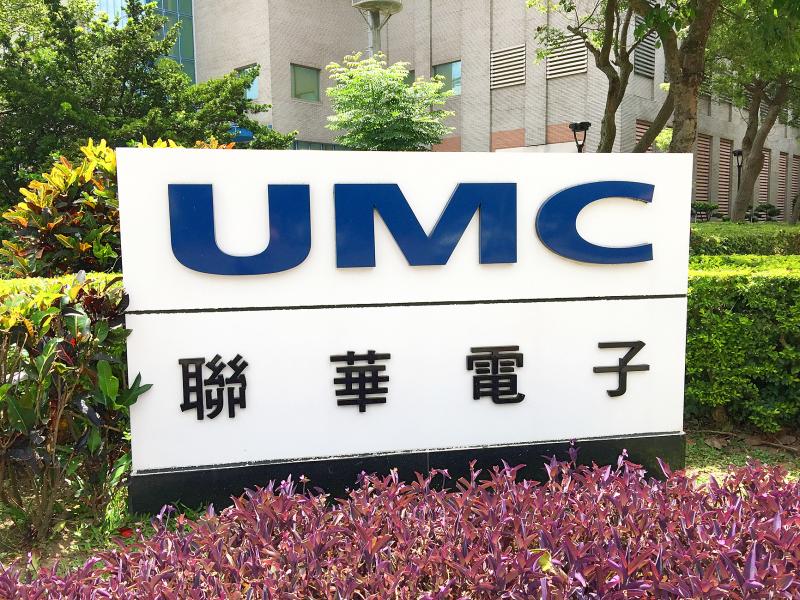United Microelectronics Corp (UMC, 聯電), the world’s No. 3 contract chipmaker, yesterday said that its board of directors has approved a plan to pay a cash dividend of NT$1.6 per share this year, up from NT$0.75 last year and the highest in 21 years.
Based on the plan, UMC would pay NT$19.88 billion (US$702.32 million) in cash dividends to shareholders this year.
The payout ratio was about 66 percent, as the company earned NT$2.42 per share last year.

Photo: Grace Hung, Taipei Times
The planned dividend represents a yield of 2.93 percent, based on the stock’s closing price of NT$54.7 yesterday.
The payout plan is subject to shareholders’ approval at the company’s annual general meeting on June 8, UMC said.
The board of directors also approved a capital appropriation plan of NT$6.23 billion, which UMC would use for capacity expansion, the Hsinchu-based chipmaker said, without providing further details.
Last month, UMC told investors that it was raising capital expenditure to US$1.5 billion to expand capacity, as a supply crunch is expected to persist.
Smartphone and work-from-home-related demand remained strong, while a pickup in automotive chips was adding to an already tight supply of chips, it said.
The board approved a plan to raise funds via an issuance of 1.38 billion new common shares.
UMC is seeking a strategic and technological alliance with potential investors at home and abroad through a private placement, the company said.
Separately, Delta Electronics Co (台達電) said that its board of directors approved a plan to pay a cash dividend of NT$5.5 per share this year, a filing with the Taiwan Stock Exchange showed.
The planned cash dividend represents a payout ratio of 56.07 percent, based on the company’s earnings per share of NT$9.81 last year.
Delta, the nation’s leading power and thermal solutions provider, last year distributed a cash dividend of NT$5 per share to shareholders.
The proposed payout for this year is subject to shareholders’ approval at the company’s annual general meeting on June 11 in Taoyuan, it said.
Additional reporting by Angelica Oung

TECH BOOST: New TSMC wafer fabs in Arizona are to dramatically improve US advanced chip production, a report by market research firm TrendForce said With Taiwan Semiconductor Manufacturing Co (TSMC, 台積電) pouring large funds into Arizona, the US is expected to see an improvement in its status to become the second-largest maker of advanced semiconductors in 2027, Taipei-based market researcher TrendForce Corp (集邦科技) said in a report last week. TrendForce estimates the US would account for a 21 percent share in the global advanced integrated circuit (IC) production market by 2027, sharply up from the current 9 percent, as TSMC is investing US$65 billion to build three wafer fabs in Arizona, the report said. TrendForce defined the advanced chipmaking processes as the 7-nanometer process or more

China’s Huawei Technologies Co (華為) plans to start mass-producing its most advanced artificial intelligence (AI) chip in the first quarter of next year, even as it struggles to make enough chips due to US restrictions, two people familiar with the matter said. The telecoms conglomerate has sent samples of the Ascend 910C — its newest chip, meant to rival those made by US chipmaker Nvidia Corp — to some technology firms and started taking orders, the sources told Reuters. The 910C is being made by top Chinese contract chipmaker Semiconductor Manufacturing International Corp (SMIC, 中芯) on its N+2 process, but a lack

NVIDIA PLATFORM: Hon Hai’s Mexican facility is to begin production early next year and a Taiwan site is to enter production next month, Nvidia wrote on its blog Hon Hai Precision Industry Co (鴻海精密), the world’s biggest electronics manufacturer, yesterday said it is expanding production capacity of artificial intelligence (AI) servers based on Nvidia Corp’s Blackwell chips in Taiwan, the US and Mexico to cope with rising demand. Hon Hai’s new AI-enabled factories are to use Nvidia’s Omnivores platform to create 3D digital twins to plan and simulate automated production lines at a factory in Hsinchu, the company said in a statement. Nvidia’s Omnivores platform is for developing industrial AI simulation applications and helps bring facilities online faster. Hon Hai’s Mexican facility is to begin production early next year and the

Who would not want a social media audience that grows without new content? During the three years she paused production of her short do-it-yourself (DIY) farmer’s lifestyle videos, Chinese vlogger Li Ziqi (李子柒), 34, has seen her YouTube subscribers increase to 20.2 million from about 14 million. While YouTube is banned in China, her fan base there — although not the size of YouTube’s MrBeast, who has 330 million subscribers — is close to 100 million across the country’s social media platforms Douyin (抖音), Sina Weibo (新浪微博) and Xiaohongshu (小紅書). When Li finally released new videos last week — ending what has